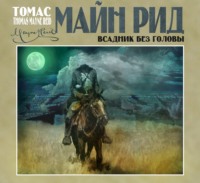 полная версия
полная версияGaspar the Gaucho: A Story of the Gran Chaco
Perfect safety they find at the Sacred Town, and hospitality too, great as when Naraguana himself dispensed it. For is not Kaolin now cacique– he who saved them from death and destruction?
Kindly he extends his protection, and generously bestows his hospitality. But they do not for long need the former, nor are they called upon to abuse the latter by a too protracted stay. Shortly after their arrival at the Sacred Town, they get news which, though of death, gives them joy, as it only could and should; since it is the death of that man who has been the cause of all their miseries. José Francia, feared far and wide throughout Paraguay, and even beyond its borders, has at length paid the debt due by all men, whether bad or good. But although dead, strange to say, in the land he so long ruled with hard ruthless hand, still dreaded almost as much as when living; his cowed and craven subjects speaking of him with trembling lips and bated breath, no more as “El Supremo,” but “El Defunto!”
The Señora Halberger believes she may now return to her native country, without fear of further persecution from him. But Caspar thinks otherwise; deeming it still unsafe, and pointing out the danger of their being called to account for what they were not guilty of – the slaughter of the cuarteleros in the defile. In fine, he urges her to make her future home in the Argentine States; a pleasanter land to live in, besides being a land of liberty, and, above all, the orthodox country of his own class and kind, the gauchos.
Observing the justness of his arguments, she consents to follow his advice; and to the Argentine States they all go, journeying across many great rivers and through hundreds of miles of wilderness. But they are not permitted to travel either unprotected or alone; for Kaolin accompanies them, with a band of his best braves – Nacena also forming one of the escort.
The Tovas cacique sees them over the Salado river, and within safe distance of the outlying settlements of San Rosario, there leaving them. But when he parts company, to return to the Sacred Town, his sister returns not with him. Though as a brother he be dear to her, she has found one dearer, with whom she prefers to stay. And does stay, Kaolin himself consenting; since the dearer one is his own friend and former playmate. The gentle Ludwig has at length succeeded in winning the heart of the savage maiden – still whole, despite the tearing of a misplaced passion, long since passed away.
Our tale could be prolonged, and the characters who have figured in it followed further; but not through scenes of the same exciting character as those already detailed. Instead, the record of their after life, though not devoid of stirring incident, is more signalised by scenes of peace and prosperity. The reader will be satisfied with a peep at it, obtained some ten years later than the date of their settling down in the Argentine States. A traveller at this time passing from San Rosario to the German Colonies recently established on the Salado river, near the old but abandoned missionary settlement of Santa Fé, could not fail to observe a grand estancia; a handsome dwelling-house with outbuildings, corrals for the enclosure of cattle, and all the appurtenances of a first-class ganaderia, or grazing establishment. Should he ask to whom it belongs, he would have for answer, “The Señora Halberger;” and if curiosity led him to inquire further, he might be told that this lady, who is una viuda, is but the nominal head of the concern, which is rather owned conjointly by her son and nephew, living along with her. Both married though; the latter, Señor Cypriano, to her daughter and his own cousin; while the former, Señor Ludwig, has for his wife an Indian woman; with possibly the remark added, that this Indian woman is as beautiful and accomplished as though she were a white.
Were the traveller to deviate a little from his route, and approach near enough to the house, he might see the members of this double though united family, surrounded by several pretty children of both sexes, strolling about in happy harmony, and with that freedom from care which speaks of wealth, at the same time telling of its having been honestly acquired.
Whether or not such a tableau be presented to the traveller’s eye, one man who should figure in it would sure be seen moving about the place. For he is the mayor-domo of the estate, and if not actual master, the manager of all. As in that old estancia near the northern bank of the Pilcomayo, so in this new and grander one on the southern side of the Salado, everything is entrusted, as safely it may be, to GASPAR, THE GAUCHO.









